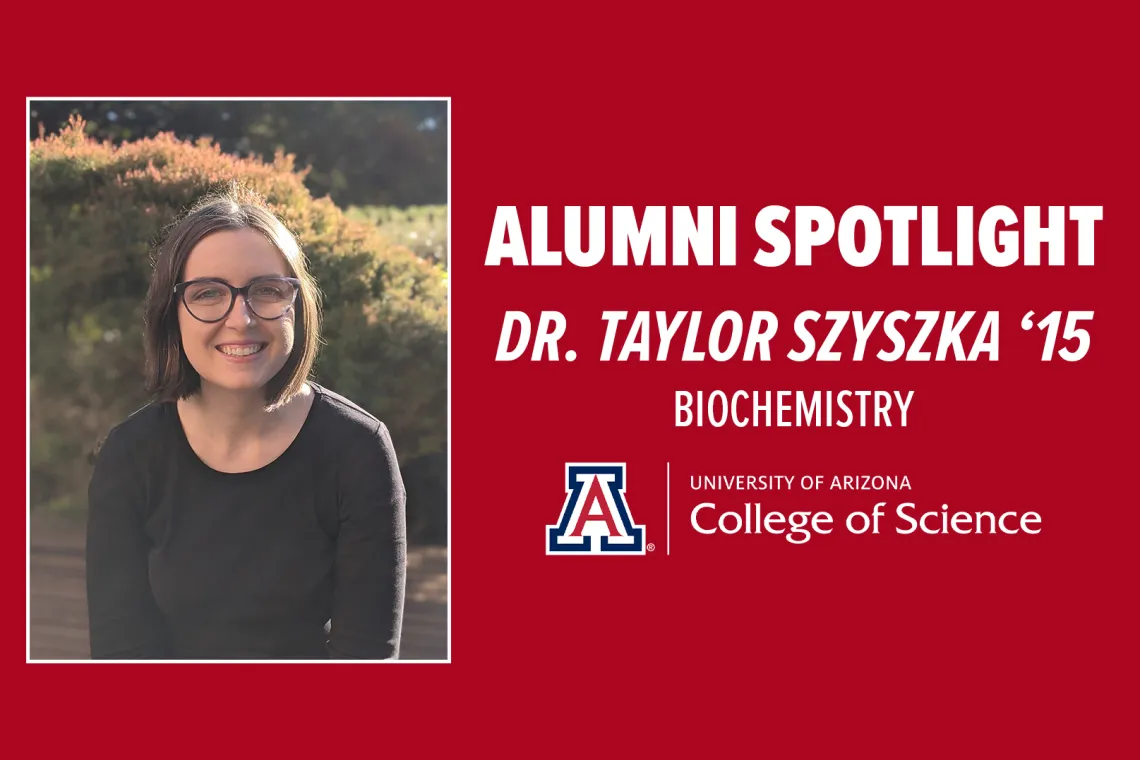Alumni Spotlight: Dr. Taylor Szyszka

Dr. Taylor Szyszka, a graduate from the College of Science, received her degree in Biochemistry in 2015. Dr. Szyszka was such an outstanding student during her time at the University of Arizona, she was awarded a scholarship to pursue a PhD at the University of Sydney in Australia. She now works as a Postdoctoral Research Associate in Australia, where she engineers protein nanocompartments.
Dr. Szyszka spoke with the College of Science to reflect on her time as an undergraduate and how it prepared her to start a career in the world of science.
Dr. Taylor Szyszka
Current job title/position: Postdoctoral Research Associate
Degree(s) from UA: Bachelor of Science in Biochemistry
College of Science: How was your experience at the University of Arizona?
Dr. Szyszka: I absolutely loved my experience at the UofA! As an out of state student, I fell in love with Tucson and life in the desert and I thrived in the tight-knit community of CBC. I was heavily involved in the Chemistry Club and served as president my senior year. It was this experience that most enriched my university years; I made incredible friends, was surrounded with passionate people, and through these relationships I became involved in undergraduate research which paved the way for my career now.
COS: What was one of your favorite labs you worked in?
Dr. Szyszka: I spent three years in the protein evolution lab of A/Prof. Matthew Cordes working closely with Dr. Vlad Kumirov, where I discovered my passion for protein NMR and structural biology.
COS: How did your time at UArizona prepare you for post-graduation life?
Dr. Szyszka: After graduation, I was awarded an international student scholarship for my PhD studies under Prof. Joel Mackay at The University of Sydney in Australia. During my PhD I used NMR to elucidate the structure of a transcription factor protein domain binding to a small peptide and did preliminary drug discovery work to develop a small molecule inhibitor to block this interaction, which could potentially be of therapeutic value. Inspired by my time in the Chemistry Club I also became an avid science communicator, working closely with school students and the public, and even appeared in a few seasons of a children’s science TV show called “Get Clever!”
COS: What does your career look like now after you finished your PhD?
Dr. Szyszka: After my PhD I spent a few years pursuing science communication at the high school and university level before starting my current role as a postdoctoral research associate at The University of Sydney. I now work in the lab of Dr. Yu Heng Lau, where I use my protein knowledge to engineer protein nanocompartments to enhance the activity of important enzymes to improve the way photosynthetic organisms convert CO2 into sugar. I know that my time in CBC gave me the skills and confidence to move to a new country and embark on an academic career, and I couldn’t imagine a better place to start my scientific training!

